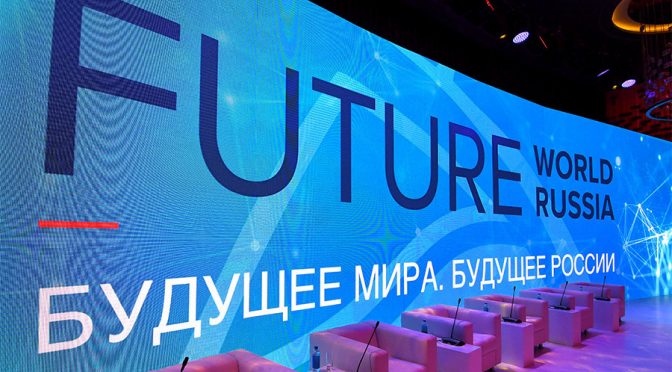Around 600 participants from 71 countries met in Crimea at the 4th Yalta International Economic Forum to discuss global cooperation and the building of a better world.
This was the real ‘international community,’ as opposed to the pretend one restricted to just the US and its closest allies.
In February 1945, Churchill, Roosevelt, and Stalin, the so-called ‘Big Three,’ met in Yalta to plan for the post-war world. In April 2018, the world faces the threat of war again – not from goose-stepping Nazis – but from similarly Russophobic neocon hawks who seem hell-bent on total global domination.
The imperialist agenda has been thwarted in Syria, where regime-change plans have been blocked, hence a ratcheting up of Cold War 2.0 tensions with Russia from Washington and London. But at the YIEF, one could see the strength of resistance to the serial warmongers.
I had the great honor to be asked to be the moderator for a debate on The Future of the World, which included a diverse lineup of speakers from nine different countries. I opened proceedings by noting that this month marked the 50th anniversary of Tony Richardson’s classic anti-war film The Charge of the Light Brigade, which covered events which took place not far from where the conference was taking place. In 1968, Richardson was lampooning the Establishment-induced Russophobia of the 1850s. Today, rather obscenely, we are back to where we were 160 years ago. ‘The Russians! The Russians! The Russians!’ is once again the demented cry of the political and media elite.
Journalists and other public figures in Britain today who don’t go along with Russophobia face attacks from truly repulsive gatekeepers. Even university academics are under threat for daring to question the War Party line. At least in Crimea, we didn’t have to worry about the witch-hunters.
In a passionate address which got a great reception from the audience, Oumar Mariko, a member of the National Assembly of Mali and the Secretary-General of the African Solidarity for Democracy and Independence Party, stressed how important it was that Africa’s voice was heard.
When Western hawks talk about the ‘international community,’ they never include Africa (ironically while at the same time attacking their opponents for ‘racism’), but at Yalta it was very different. Mariko said that even though African countries had gained formal independence from the old imperial powers, these powers still tried to control Africa and acted with a colonial mindset. We saw an example of this with NATO’s criminal destruction of Libya in 2011, turning the country which had the highest Human Development Index in Africa into a failed state.
From Zimbabwe, Christopher H. Mutsvangwa, special adviser to President Emmerson Mnangagwa, also discussed imperialism and how Africa had been dominated by Western nations for centuries. Now though, he argued we were entering a new historical epoch in which the power of the imperialist nations was on the wane, and that could only be positive. “We always look to Russia because Russia has always helped oppressed peoples,” he declared.
From Syria, Mohammad Samer Al-Khalil, the Minister of Economy and Foreign Trade, told how his country had turned the tide against Western-backed terrorists and how the Syrian government, against all the odds, had managed to maintain free education and the provision of social services throughout the conflict. He urged delegates to invest in his country, and help the rebuilding process.
Speaker after speaker denounced the sanctions imposed against Russia, which Oumar Mariko called “absolutely illegal.” Europe in particular was acting against the economic interests of its own people by going along with these sanctions – at the behest of the US and UK.
“We want to sell cars to Russia and Russia wants to sell us gas,” Bundestag member Markus Frohnmaier said. So why can’t we just get on and trade freely, instead of just tamely following the diktats of the US?
The importance of free trade in improving relations between countries was stressed by UK MEP Bill Etheridge. The British people do not want enmity with Russia he assured the hall. The fact, as I pointed out afterwards, is that Russophobia, as in the 1850s, is very much an Establishment phenomenon, and the UK government’s fiercely anti-Russian line shows us how undemocratic the UK is.
If Britain was a genuine democracy we’d be working with Russia against terrorism – not against Russia. We certainly wouldn‘t be risking a potentially disastrous war with a nuclear-armed power to aid the cause of Salafist-jihadists in Syria.
Former Prime Minister of Slovakia Jan Carnogursky focused on Crimea and how sanctions could be lifted. “We call on all the nations of the world to accept and support the results of the Crimean referendum of 2014,” he said.
From Austria, another country which, to its credit, didn’t join in with the expulsion of Russian diplomats at the behest of Theresa May, the deputy mayor of Linz, Detlef Wimmer, greeted the audience in Russian, before making a strong case for a change in European policies. From France, MEP Nicolas Bay criticized his nation’s hostile stance towards Russia. Georgy Muradov, deputy prime minister of Crimea, warned of the dangers of the current tensions, saying “today we are talking about the future of the world, because we are afraid to look at the real world.”
The “real world” though is changing fast, as Yalta showed. Other events in the three-day forum included a plenary session on ‘Youth Visioning the Future,’ a conference at the Livadia Palace on the ‘Economic Development of Syria’ involving high-level delegations from Russia and Syria, a session on Russian-German environmental dialogue, and debates on fake news and digital security in the 21st century.
As the conference came to an end and we prepared to leave Crimea, one thought struck me. The kind of thought-provoking debates we had in Yalta, which provided a platform to a wide range of opinions and featured speakers that would be ‘blacklisted’ at home, eg. Syrian government officials, simply could not take place in modern thought-policed Britain. How ironic that for all the highfalutin talk about ‘freedom’ and ‘democracy,’ Westerners now have to go to Russia to speak their minds freely.
Neil Clark is a journalist, writer, broadcaster and blogger. He has written for many newspapers and magazines in the UK and other countries including The Guardian, Morning Star, Daily and Sunday Express, Mail on Sunday, Daily Mail, Daily Telegraph, New Statesman, The Spectator, The Week, and The American Conservative. He is a regular pundit on RT and has also appeared on BBC TV and radio, Sky News, Press TV and the Voice of Russia. Follow Neil Clark on Twitter @NeilClark66
- https://www.rt.com/op-ed/425471-neocons-yalta-crimea-economy/



The “global system”, can if WE really wish it, be totally circumvented. If enough people contacted the leaders of the “free world”, and proposed an alternative trade agreement, instead of merely watching events happen, we could be cogs in an alternative system.
Agreed Ironkraft, this is what the world needs today. I am sure many of our ‘leaders’ ask this same question time after time, why are they jumping to every demand the western allies propose? Perhaps we, as you have already mentioned should draw up new trade agreements and throw the previous ones into ‘file 13’.
“We want to sell cars to Russia and Russia wants to sell us gas,” Bundestag member Markus Frohnmaier said. So why can’t we just get on and trade freely, instead of just tamely following the diktats of the US?
Good to see more and more countries asking this question!